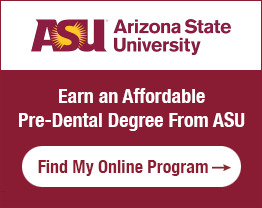The New Jersey Department of Labor and Workforce Development has named dental hygiene among its list in-demand occupational fields. In 2012, the Department reported 5,500 dental hygienist jobs in New Jersey. By 2022, it is projected that there will be 6,900 jobs in dental hygiene, representing an average of about 280 annual openings.
The New Jersey State Board of Dentistry regulates the practice of dentistry and dental hygiene in the State of New Jersey.
Featured Programs:
- Online
- Online
If you want to become a dental hygienist in New Jersey, you must be licensed through the State Board of Dentistry, which will require you to complete the following steps:
Step 1. Complete a CODA-Accredited Dental Hygiene Program
Before you can begin completing the steps needed to become licensed as a dental hygienist in New Jersey, you must successfully complete an educational program in dental hygiene that is accredited by the Commission on Dental Accreditation (CODA), which is recognized by both the U.S. Department of Education and the American Dental Association (ADA).
CODA-accredited programs in dental hygiene may be two-year (associate degree) programs or four-year (bachelor degree) programs, although the minimum degree requirement for licensure is an associate degree (A.S., A.S., or A.A.S.).
A CODA-accredited program includes all coursework necessary to sit for the National Board Dental Hygiene Examination and the required regional clinical examination.
Curriculum in a CODA-accredited program includes general education courses, such as psychology and sociology; science courses such as biology, biochemistry, and microbiology; dental science courses such as radiology and dental anatomy; and dental hygiene courses such as clinical periodontics, oral health education, and community dental health.
In New Jersey, there are currently 6 CODA-accredited dental hygiene programs.
Step 2. Take and Pass the National Board Dental Hygiene Examination
Upon the completion of a CODA-accredited dental hygiene program, you must take and pass the National Board Dental Hygiene Examination (NBDHE). This written examination, which consists of two parts and 350 questions, is administered through the Joint Commission on National Dental Examinations (JCNDE).
Although you must register to take the examination through JCNDE (www.ada.org), you must take the NBDHE through one of the many Pearson VUE testing centers throughout the U.S., including Princeton, Somerset, Jersey City, and Lyndhurst, New Jersey.
Step 3. Take and Pass the Commission on Dental Competency Assessments Examination
In addition to a written examination, dental hygienist licensure also requires the completion of a clinical (practical) examination. The New Jersey Board of Dentistry recognizes the Commission on Dental Competency Assessments examination to satisfy the clinical assessment requirement for licensure.
In New Jersey, you may take this practical examination at the following locations:
- Burlington County College, Pemberton
- Camden County College, Blackwood
- Middlesex County College, Edison
- Rutgers School of Dental Medicine, Scotch Plains
You can view the upcoming exam event calendar here and view the examination manuals here.
Step 4. Apply for a Dental Hygienist License in New Jersey
Once you have met all requirements for licensure as a dental hygienist in New Jersey, you must submit a completed and signed Application for Dental Hygienist License and include the following materials with your application:
- A certified transcript where you obtained your CODA-accredited dental hygiene program degree (sent directly from the institution in a sealed envelope)
- A passport-size photograph that has been signed and notarized
- Your National Dental Hygiene Board examination results (sent directly to the Board)
- Your Commission on Dental Competency Assessments examination results
- The result of the completion of the New Jersey Jurisprudence examination (You must complete an application to sit for the examination.)
- Results of a criminal history background check conducted by the State of New Jersey
- Application fee of $75 (made payable to the State of New Jersey)
Step 5. Apply for Permit for the Administration of Local Anesthesia
You may be permitted, as a licensed dental hygienist, to administer local anesthesia if you possess a local anesthesia permit issued by the Board of Dentistry, which includes completing a Board-approved course in the administration of local anesthesia offered by CODA or through an accredited college, university, teaching hospital, or other training facility approved by the Board.
You must submit the course outline, its content and objectives, and its curriculum vitae of course instructors to the Board for approval. Further, the course must include instruction in:
- Administration of reversal agents
- Emergency procedures
- Head and neck anatomy
- Patient pre-evaluation
- Pharmacology of anesthetic and analgesic agents
- Recognition of adverse events
- Selection of appropriate armamentarium, agents, and techniques
The course must also include:
- At least 20 hours of didactic training
- At least 12 hours of clinical training
- Clinical training must include at least 25 monitored administrations of local anesthesia
Once you have met the above course requirement, you must take and pass a written examination in the administration of local anesthesia administered by the Commission on Dental Competency Assessments and complete an Application for Local Anesthesia Permit.
To maintain your permit, you must complete at least 4 continuing education credits every other biennial renewal period.
Step 6. Maintain your Dental Hygienist License in New Jersey
All dental hygienist licenses expire every two years, at which time you must verify the completion of at least 20 hours of continuing education. Continuing education resources may be found through the New Jersey Dental Hygienists Association.








